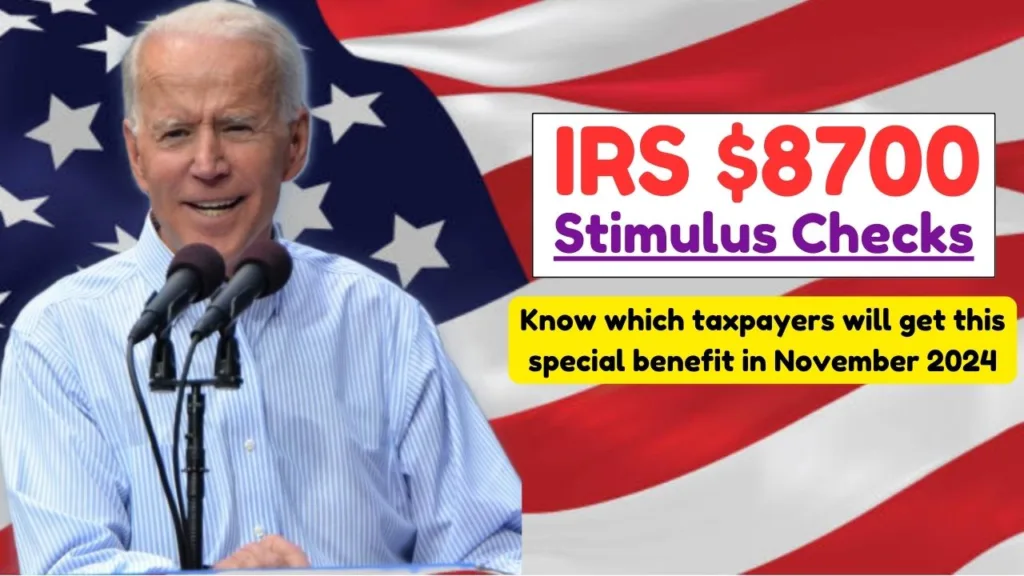IRS $8700 Stimulus Checks: Since the pandemic, the government has issued stimulus checks several times as financial aid. This time, a big announcement has been made by the IRS in which some special taxpayers will be given a stimulus check of $8,700. Everyone wants to know about this new benefit to be available in November 2024 – who are the people entitled to this amount, and what are the conditions to be met for eligibility? If you also want more information about this stimulus check, then this article is for you.
A rumour is spreading rapidly in the US that the IRS will send an $8,700 stimulus check in 2024. This rumour has shocked many people, but is there any truth in it? Let’s take a look at the facts and know the reality of this rumour. Also, we will also give information about the real benefits that are really available.

IRS $8,700 Stimulus Check – Truth or Myth?
Recall that during the COVID-19 pandemic, the government issued stimulus checks (Economic Impact Payments) three times to provide relief to people from the economic crisis. But no new stimulus check was announced after the third round. The IRS has already said that there is no plan for a fourth stimulus check, so giving a new check of $8,700 is not on their list.
Now the question arises, where did this rumour come from? In fact, some people are linking it to the Child Tax Credit (CTC) and some state-level assistance schemes. But keep in mind, not all these schemes provide $8,700, nor are they stimulus checks. These are only tax credits and some small relief, which do not give direct cash amount.
What is Child Tax Credit (CTC) and how does it work?
Child Tax Credit is a tax credit that provides relief of up to $2,000 per child for eligible families. This credit is especially for families whose income falls within certain limits.
| Eligibility Criteria | Child Tax Credit (CTC) 2023 |
| Maximum Credit Per Child | $2,000 |
| Income Limit for Single Filers | $200,000 |
| Income Limit for Married Filers | $400,000 |
| Age Requirement | Under 17 years at year’s end |
| Other Requirements | Must be U.S. citizen or resident alien, reported as dependent on tax return |
Note, this is a $2,000 credit per child, not a direct payment of $8,700. So, misinterpreting this credit as a stimulus check is completely wrong.
What is the truth of the $8,700 stimulus check rumour?
Let’s clear up this $8,700 myth. This rumour is actually going around on social media or some websites. Let’s understand it through some important facts:
- No official announcement: The IRS has not announced any new $8,700 checks. Whatever you are reading on the internet about this, it is just a rumour.
- Incidents of fraud: Many scammers are trying to defraud people under the guise of old relief schemes during the time of COVID-19. These scams often try to get personal information from people by luring them with “free money”.
IRS warning: Beware of stimulus scams
The IRS constantly warns people to be cautious of such scams. Scammers often make fake calls or emails pretending to be government officials, and try to dupe people of their personal information and money. The IRS has clearly stated that they do not call or email to deliver any kind of check.
Who can get real IRS benefits?
Now, what are the IRS benefits that are actually available to people? Let’s find out:
Earned Income Tax Credit (EITC): This credit is for people who fall in the low- or middle-income category. Eligible taxpayers can get up to $7,000 under this credit.
Child Tax Credit (CTC): As mentioned earlier, this is a credit of $2,000 per child for eligible parents.
State-level schemes: Many states have introduced some financial assistance schemes in view of rising inflation. These schemes vary according to each state’s eligibility and amount, and are different from federal assistance.
Old stimulus checks: If someone hasn’t received a previous stimulus check from the COVID-19 era, they can claim it on their 2023 tax return.
Ways to avoid scams: How to stay safe?
Don’t fall for rumours, and don’t be tempted by fake stimulus checks. Here are some tips that can keep you safe:
Verify information:
- For any government assistance or payments, visit the IRS website (IRS.gov) to get information.
Avoid suspicious phone calls and emails:
- The IRS never asks for your personal information over the phone, email, or social media.
Report suspicious activity:
- Report any scam to the IRS or the Federal Trade Commission (FTC) so that more people can avoid such fraud.
If you follow these tips, you will be able to make better financial decisions and stay away from scammers. Don’t be fooled by rumours and always get information from official sources.
So, the next time you hear about $8,700 checks, just consider it a rumour. The government has not launched any such major relief program, and stop paying attention to social media rumours.
Fact Check
Disclaimer:This article will tell you the truth behind a rumour related to the IRS. Such rumours can confuse people, so always be cautious and get information only from official sources.